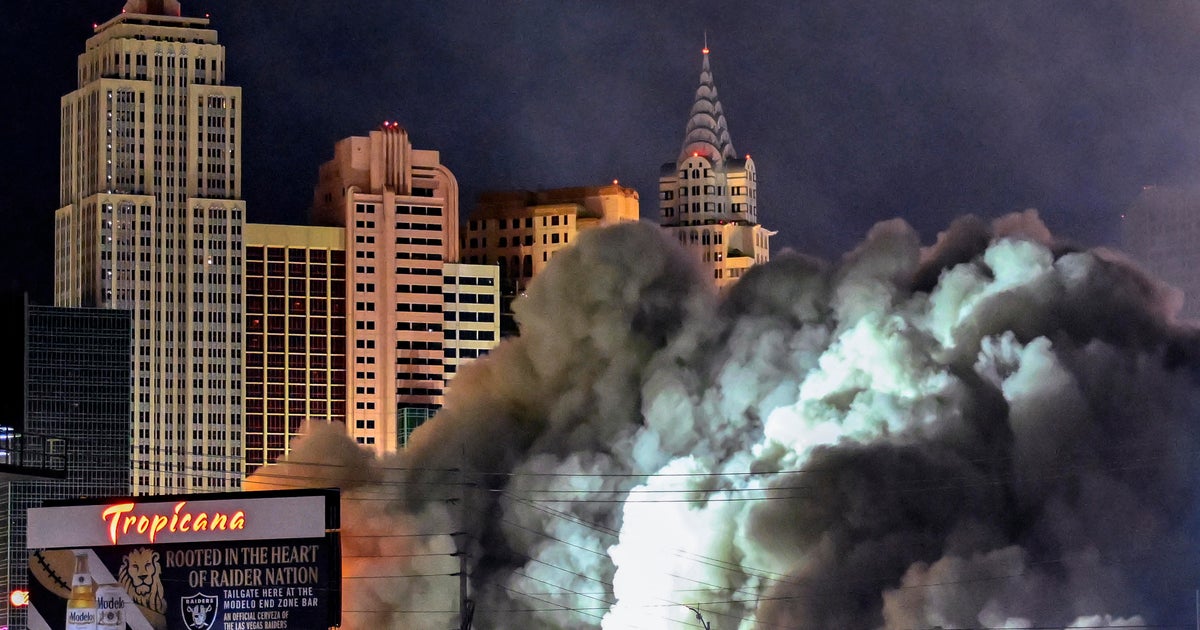Sin City blew a kiss goodbye to the Tropicana before first light Wednesday in an elaborate implosion that reduced the last real mafia building on the Las Vegas Strip to rubble.
The Tropicana hotel towers collapsed during a party with fireworks. It was the first implosion in nearly a decade for a city that loves fresh starts and has made casino implosions as much a part of its identity as gambling itself.
The casino concluded with a seven-minute celebration involving 550 drones and 150 “pyrodrones,” culminating in the controlled demolition of the resort that was originally built in 1957, CBS affiliate KLAS-TV reported.
“What Las Vegas has done, in classic Las Vegas style, has turned a lot of these implosions into a spectacle,” said Geoff Schumacher, historian and vice president of exhibitions and programs at the Mob Museum.
David Becker/AP
Former casino magnate Steve Wynn changed the way Las Vegas blew up casinos in 1993 with the implosion of the Dunes to make way for the Bellagio. Wynn not only thought about televising the event, but also created a fantastic story for the implosion that made it look like pirate ships were shooting at the Dunes in his other casino across the street.
From that moment on, Schumacher said, there was a sense in Las Vegas that destruction of that magnitude was worth seeing.
The city hasn’t blown up a Strip casino since 2016 last tower of the Riviera was leveled for the expansion of a conference center.
This time, the implosion cleared land for a $1.5 billion baseball stadium for the relocating Oakland Athletics, part of the city’s latest rebranding as a sports center.
That leaves only the Flamingo from the mafia era on the Strip. But, Schumacher said, the Flamingo’s original structures are long gone. The casino was completely rebuilt in the 1990s.
The Tropicana, the third-oldest casino on the Strip, closed in April after 67 years of welcoming guests.
Once known as the ‘Tiffany of the Strip’ for its opulence, it was a frequent haunt of the legendary Rat Pack, while its past among the mafia has long cemented its place in Las Vegas history.
It opened in 1957 and had three floors and 300 hotel rooms spread over two wings.
As Las Vegas developed rapidly in the ensuing decades, including a construction boom of mega-resorts on the Strip in the 1990s, the Tropicana also underwent major changes. In later years, two hotel towers were added. In 1979, the beloved $1 million green-and-amber stained glass ceiling was installed above the casino floor.
However, the Tropicana’s original low-rise hotel wings survived many renovations, making it the last true Mafia building on the Strip.
Behind the scenes of the casino’s grand opening, the Tropicana had ties to organized crime, largely through well-known gangster Frank Costello.
Costello was shot in the head weeks after the Tropicana’s debut in New York. He survived, but the investigation led police to a piece of paper in his jacket pocket showing the Tropicana’s exact revenue figure, showing the Mafia’s interest in the casino.
In the 1970s, federal authorities investigating gangsters in Kansas City accused more than a dozen agents of conspiring to siphon $2 million in gambling revenue from Las Vegas casinos, including the Tropicana. The charges related to the Tropicana alone resulted in five convictions.
KLAS-TV reported that the resort also served as Michael Corleone’s Las Vegas casino company in the 1972 film “The Godfather.”
There were no public viewing areas for the event, but fans of the Tropicana did have a chance to say goodbye to the vintage Vegas relic in April.
“Old Vegas, it’s going,” New Jersey resident Joe Zappulla said through tears as he left the casino shortly before the locks went up on the doors.
As KLAS-TV notes, other long-gone hotels in Las Vegas include The New Frontier, The Stardust Resort and Casino, Castaways Hotel and Casino, Boardwalk Hotel and Casino, Bourbon Street Hotel and Casino, Desert Inn, El Rancho, Aladdin, Hacienda, Sands, Landmark and the Dunes.
